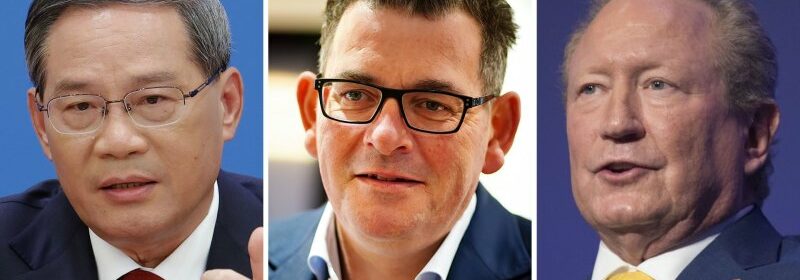Forrest insists China is not a national security threat

Singapore: Mining billionaire Andrew Forrest claims China does not pose a national security threat, is no more protectionist than Australia or the United States and that the countries should all put aside their political differences to coordinate on climate change.
Speaking before meeting with Chinese Premier Li Qiang on Wednesday afternoon, Forrest called on the Australian government to make it clear that the $368 billion AUKUS nuclear submarine deal was to “defend our nation only never to attack another”.
Fortescue Metals Group chairman Andrew Forrest.Credit:Michael Quelch
“It’s been left unsaid but let’s say it. Let’s say that we’re not paying the largest single investment in Australia’s military history for anything but defence and peaceful purposes,” he said in an interview with The Sydney Morning Herald and The Age from the Boao Forum on the Chinese island of Hainan.
Australia’s richest man is the first Australian to have met in person with Li since he was appointed as China’s second-in-command earlier this month. He has been a key lieutenant of Chinese President Xi Jinping for the past two decades. Forrest and Li have two meetings scheduled on Wednesday and Thursday when they will open the Boao Forum.
Forrest said he would be comfortable raising the cases of detained Australians Cheng Lei and Yang Hengjun with Li. Yang was first detained in January 2019, Cheng has been jailed since August 2020. Both have faced brutal conditions in Chinese jails including solitary confinement with limited access to consular support.
“I have no issue whatsoever advocating their cases, but I will not be talking about it,” said Forrest.
Forrest’s trip to China coincides with Victorian Premier Daniel Andrews’s visit to Beijing. Andrews has been urged by Cheng’s partner Nick Coyle to raise her case with Chinese authorities but the Victorian Premier has refused to do so because they are “deeply sensitive matters” that are “best dealt with by the Australian foreign service”.
Forrest has billions of dollars worth of business interests in China through his company Fortescue – one of China’s largest iron ore suppliers. The miner and philanthropist was criticised for intervening in foreign affairs during the height of the COVID-19 pandemic but has maintained the highest public contact with Chinese officials of any Australian.
Forrest’s assessment of the security risks of China sits at odds with Australian intelligence services, the defence establishment and the foreign policy position of both Labor and the Coalition, which have warned China’s military build-up is the biggest seen since the end of the second world war.
In March, China’s Foreign Minister Qin Gang warned that if the United States did not hit the brakes but continued “to speed down the wrong path, no amount of guardrails can prevent derailing and there will surely be conflict and confrontation”.
Forrest dismissed the threat from China and accused politicians and foreign policy analysts of “just trying to scare people”.
“If we’re building subs for protection, that’s great,” he said. “It’s like an insurance policy. We hope we’ll never need them, but I don’t see national security concerns with China. Its demographics and logistics are too ridiculous to even contemplate it.”
Forrest said Li told him and other chief executives including Apple chief executive Tim Cook at a business meeting in Beijing on Monday that he would be relying on the “global investment community to really help China on its path to opening up to a peaceful, shared future for humanity”.
Business leaders in China have been concerned by what they say is growing state control over the private economy as Xi steers through his visions of “internal circulation” and “common prosperity”.
Chinese Premier Li Qiang. Credit:Getty
The Chinese government has been attempting to straddle a pro-business outlook at the same time as it tightens controls over any market threats to Chinese Communist Party ideology and protects its economy from global sanctions.
Forrest said he did not believe China was any more vigilant about threats to its economic security than the West.
“I don’t think there are behaviours that I don’t see reflected in every other country or what we do in Australia as well as North America,” he said.
Forrest said Beijing and Washington and Canberra needed to put their differences aside to collaborate on climate change.
“We could cook instead. We have got to get cracking. This is way above petty politics,” he said.
“[China] is a country that could really turn the battle against global warming, which is on the precipice of a really efficient manufacturing supply chain, not just for wind, not just solar, not just for electrolysers but for trucks, trains, ship engines, everything we need to send our world green.”
Get a note directly from our foreign correspondents on what’s making headlines around the world. Sign up for the weekly What in the World newsletter here.
Most Viewed in World
From our partners
Source: Read Full Article

